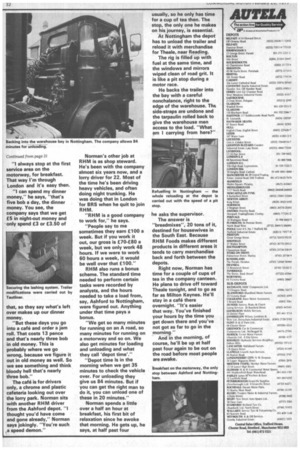Continued from page 31
Page 36

If you've noticed an error in this article please click here to report it so we can fix it.
"I always stop at the first service area on the motorway, for breakfast. That way I'm through London and it's easy then.
"I can spend my dinner money," he says, "that's five bob a day, the dinner money. You see, the company says that we get £5 in night-out money and -only spend E3 or £3.50 of that, so they say what's left over makes up our dinner money.
"But these days you go into a café and order a jam roll. That costs 13 pence and that's nearly three bob in old money. This is probably where we go wrong, because we figure it out in old money as well. So we see something and think bloody hell that's nearly three bob."
The café is for drivers only, a chrome and plastic cafeteria looking out over the lorry park. Norman sits with another RHM driver from the Ashford depot. "I thought you'd have come and gone already," Norman says jokingly. "You're such ,a speed demon." Norman's other job at RHM is as shop steward. He's been with the company almost six years now, and a lorry driver for 22. Most of the time he's been driving heavy vehicles, and often doing night trunking. He was doing that in London for BRS when he quit to join RHM. "RHM is a good company to work for," he says.
"People say to me sometimes they earn £100 a week. But if you work it out, our gross is £70-£80 a week, but we only work 48 hours. If we were to work 60 hours a week, it would be well over that £100."
RHM also runs a bonus scheme. The standard time needed to perform certain tasks were recorded by analysts, and the hours needed to take a load from, say, Ashford to Nottingham, were figured out. Anything under that time pays a bonus.
"We get so many minutes for running on an A road, so many minutes for running on a motorway and so on. We also get minutes for loading and unloading and what they call 'depot time'."
"Depot time is in the morning when we get 35 minutes to check the vehicle over. For unloading they give us 84 minutes. But if you can get the right man to do it, you can unload one of these in 20 minutes."
Norman spends a little over a half an hour at breakfast, his first bit of relaxation since he awoke that morning. He gets up, he says, at half past four usually, so he only has time for a cup of tea then. The stop, the only one he makes on his journey, is essential.
At Nottingham the depot has to unload the trailer and reload it with merchandise for Theale, near Reading.
The rig is filled up with fuel at the same time, and the windows and mirrors wiped clean of road grit. It is like a pit stop during a motor race.
He backs the trailer into the bay with a careful nonchalance, right to the edge of the warehouse. The, side-straps are undone and the tarpaulin rolled back to give the warehouse men access to the load. "What am I carrying from here?"
he asks the supervisor.
The answer is "breadmixes", 20 tons of it, destined for housewives in the South East. Because RHM Foods makes different products in different areas it tends to carry merchandise back and forth between the depots.
Right now, Norman has time for a couple of cups of tea in the company canteen. He plans to drive off toward Theale tonight, and to go as far as Milton Keynes. He'll stay in a café there overnight. "It's easier that way. You've finished your hours by the time you get down there and you've not got as far to go in the morning." And in the morning, of course, he'll be up at half past four again to be out on the road before most people are awake.






























































































